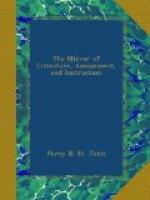“Amelia was silent.
“If not, you must take your chance; for I can do nothing further for you. For Heaven’s sake don’t treat me with a scene; for I have only a few minutes to pack up my property! The fiacre is waiting; there is not a moment to lose. Well, Amelia! what do you say?—I want an answer. Do you, or do you not choose to go to England?’
“Amelia made an affirmative movement;—she could not utter a syllable. And Vavasor instantly passed into his own room to make his preparations for immediate flight.—She never knew in what manner he took his last leave of her. When the servants proceeded to their occupations on the following morning, they found her insensible on the ground; but when restored to consciousness, the continued absence of her husband and a note of five hundred franks which he had deposited in her work-box for the purpose of enabling her to quit Paris, served to prove that the dreadful impression on her mind was not a mere delusion of the night. Alas! she was soon compelled to admit that she had looked upon him for the last time.”
* * * * *
THE CABINET ANNUAL REGISTER FOR 1831
Is a well-arranged digest of the history of the past year, in a more concise and compact form than such matters are chronicled in that woolly work—the Annual Register. The Parliamentary Summary is brief but satisfactory, and the Occurrences are copious enough for the most gossipping reader. The volume has been produced in truly good style, is, in all respects, cheap, and deserves encouragement.
* * * * *
RETROSPECTIVE GLEANINGS.
* * * * *
ORIGIN OF THE HOUSE OF RUSSEL.
“The Russel family (say Britton and Brayley,) may date the era of their greatness to a violent storm, which happened about the year 1500, on the coast of Dorset; a county which appears to have been the birthplace of their ancestors, one of whom was Constable of Corfe Castle, in the year 1221. Philip, Archduke of Austria, son of the Emperor Maximilian, being on a voyage to Spain, was obliged by the fury of a sudden tempest, to take refuge in the harbour of Weymouth. He was received on shore, and accommodated by Sir Thomas Trenchard, who invited his relation, Mr. John Russel, to wait upon the Archduke. Philip was so much pleased with the polite manners and cultivated talents of Mr. Russel, who was conversant with both the French and German languages, that on arriving at court, he recommended him to the notice of Henry VII., who immediately sent for him to his palace, where he remained in great favour till the king’s death. In the estimation of Henry VIII. he rose still higher; by that monarch he was made Lord Warden of the Stannaries, Lord Admiral of England and Ireland, Knight of the Garter, and Lord Privy Seal, and on the 9th of March, 1538, created Baron Russel, of Cheneys, in the county of Bucks, which estate he afterwards acquired by marriage. At the Coronation of Edward VI. he officiated as Lord High Steward, and two years afterwards, in the year 1549, was created Earl of Bedford. He died in 1554, and was buried at Cheneys, where many of his descendants have also been interred,” &c. &c.




